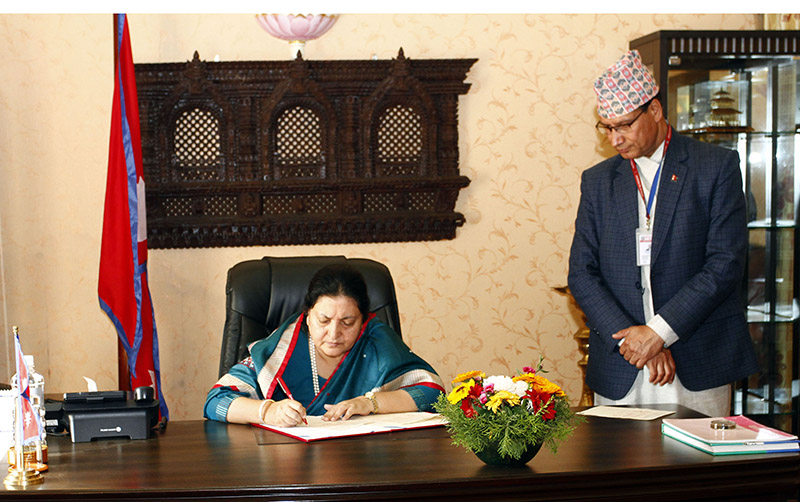President repeals controversial ordinances
Kathmandu, April 24
President Bidhya Devi Bhandari today repealed the two ordinances related to the Political Party Act and the Constitutional Council Act that she had promulgated on Monday on the recommendation of the Council of Ministers.
Article 114 of the constitution gives the president the power to repeal an ordinance at any time.
Earlier, the Council of Ministers held a meeting and decided to recommend that the president repeal the two ordinances.
Prime Minister KP Sharma Oli, who had decided to bring the two ordinances without discussing the issue with other Cochair of the party Pushpa Kamal Dahal and other influential leaders of the ruling Nepal Communist Party (NCP), decided to repeal the two ordinances after the criticism of the ordinances became untenable for the PM.
Six members of the ruling Nepal Communist Party (NCP), including Dahal, Madhav Kumar Nepal and Jhala Nath Khanal had held a meeting at Bamdev Gautam’s residence yesterday and decided that the government must repeal the ordinances. These leaders had threatened to take the issue to the Standing Committee where the PM is in minority.
The ordinance related to the Constitutional Council Act had amended the provisions of the act to allow the constitutional body to take decisions on the basis of majority. This provision was aimed at minimising the role of the leader of opposition Sher Bahadur Deuba in the Constitutional Council. Oli had told his party leaders that as the existing provision entailed the CC to take all decisions on the basis of consensus, he was required to have the consent of all members, including Deuba, but he kept boycotting meetings or lobbied for his favourites in the appointments.
The ordinance related to the Political Party Act had amended the provisions of the act to allow leaders of political parties to split their parties with the support of either 40 per cent members of their central committee or party’s lawmakers in the Parliament. Prior to the ordinance, support of 40 per cent members in both the CC and the parliamentary party was required to split a party. This provision was introduced in the act to prevent easy split of parties so that the goal of political stability could be achieved.
Opposition parties said the government’s move would invite the kind of political instability that was seen in the late 1990s.
According to a minister who attended today’s Cabinet meeting, the prime minister told the Cabinet colleagues that although he exercised his constitutional and legal rights to bring the two ordinances, his own party leaders and opposition parties opposed the promulgation of the two ordinances.
The PM told Cabinet colleagues that he decided to repeal the two ordinances to respect people’s sentiment and the opinion of his own party leaders.
A version of this article appears in e-paper on April 25, 2020, of The Himalayan Times.






